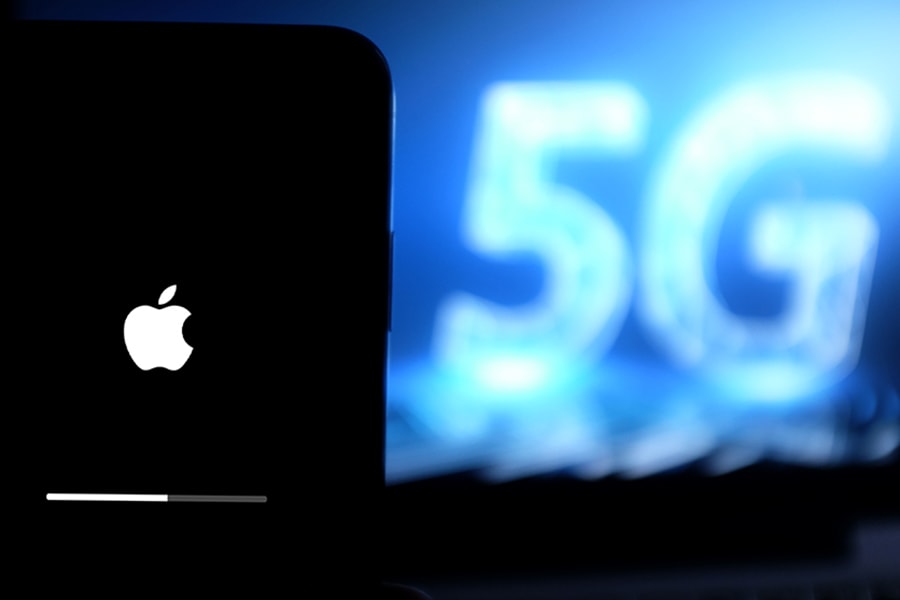Apple Introduces New iPhones, promoting their 5G capability
The iPhone 12, the successor to last year's iPhone 11, has an improved screen and faster chip. But in the near term, the new 5G cellular technology probably won't be a big leap forward


 Image: Shutterstock
Image: Shutterstock
Apple unveiled its newest iPhone on Tuesday, showcasing a model that is thinner, smaller and lighter than its predecessor, and capable of operating on the next generation of cellular networks, called 5G.
The iPhone 12, the successor to last year’s iPhone 11, has an improved screen and faster chip, among other upgrades. It has smooth, flat edges, unlike the rounded corners of past models. The screen uses OLED, a brighter display technology that replaces the older LCD technology in the last entry-level iPhone, and Apple said it toughened the glass of the touch screen, making it four times more likely to survive a drop.
The iPhone 12 will also come in two screen sizes: 5.4 inches and 6.1 inches. The smaller model, called iPhone 12 Mini, may appeal to people who prefer smaller phones.
Apple also introduced upgrades for its iPhone Pro models, its more expensive smartphones. These premium models have an extra camera lens, and their processors are slightly more powerful for taking special photos with extra high-resolution, which Apple calls deep fusion. They also include a Lidar scanner, a depth sensor that uses lasers to scan 3D objects, which could improve augmented-reality applications.
As he took the wraps off the iPhone 12 on Tuesday, Tim Cook, Apple’s chief executive, emphasized its compatibility with 5G networks.
Cook talked at length about 5G, calling it “super fast” and offering a “new level of performance for downloads and uploads.” But notably, his description lacked specificity: He did not say how much faster 5G was than current 4G phones, which many would already consider to be super speedy.
Carriers like AT&T and Verizon have hyped 5G as a life-changing technology that can process data so fast that a feature-length movie could be downloaded in seconds.
But in the near term, the new cellular technology probably won’t be a big leap forward.
The much much-hyped, ultrafast variant of 5G is known as “millimeter wave.” But its reach is limited right now. Its signals travel shorter distances, able to cover a park in New York but not a broad swath of the city, for example, and they have trouble penetrating obstacles like walls.
The version of 5G that most cellular networks are shifting to will have speeds that are roughly 20% faster than current 4G networks offer, and its main benefit is reducing a lag known as latency. When you do a web search on your phone, for example, the results show up after a time lag that can often last hundreds of milliseconds. In theory, 5G technology will shave that down to a few milliseconds.
Nonetheless, Apple and other handset makers, including Google and Samsung, are working to help carriers communicate the network shift to consumers.
Apple has stuck with a proven pricing model for the new devices, releasing the entry-level phones at $700 and up and higher-end phones starting at $1,000 — both prices in line with previous years’.
What is different this year: Apple will sell four iPhone models, up from its typical three in recent years.
At the entry level, the iPhone 12 Mini will start at $700 and iPhone 12 at $800. Last year, the iPhone 11 started at $700, meaning the flagship iPhone 12 device will start at $100 more.
On the higher end, the iPhone 12 Pro and iPhone 12 Pro Max will start at $1,000 and $1,100, identical to last year’s pricing for the latest models.
Apple might have been able to hold prices mostly steady this year by no longer including headphones and a power adapter with each phone. The company said the move was spurred by environmental concerns, but it also likely saved money and will lead many customers to buy extra accessories.
First Published: Oct 14, 2020, 10:42
Subscribe Now